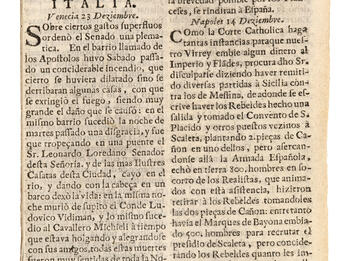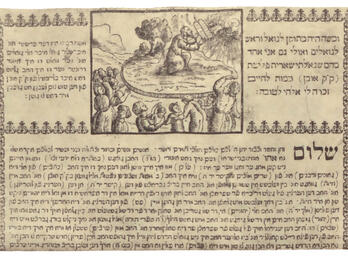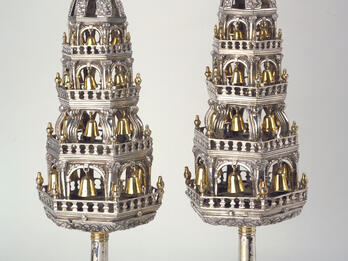Re’shit bikure katsir (First Fruits of the Harvest)
Jacob Ulma
I have examined the matter carefully, to see whether I should uphold that which they have already done, in nullifying the custom [of reciting the priestly blessing after dark, during the Ne’ilah prayer on Yom Kippur]. However, anything that I wish to say must first pass the inspection of the outstanding rabbi and doctor, our teacher R. Isaac Lampronti, my foremost rabbi (may the Merciful One protect and redeem him)—if my words find favor with him, then they can be relied upon, but if not, they should be completely disregarded. [ . . . ]
We have thus seen that even according to the Rambam [Maimonides] and those of his opinion, who follow the ruling of Rav, we are still obligated to complete the Ne’ilah prayer just before sunset, that is, at the sealing [ne’ilat] of the gates of heaven. [ . . . ]
As for the statement of R. Menaḥem Azariah da Fano, that if the Ne’ilah prayer extends to a late hour the gates of heaven remain open, he was not issuing an instruction that Ne’ilah should be recited at night, nor did he wish to have the priestly blessing recited at night. Rather, he meant that a congregation may continue with songs and supplications after the priestly blessing, in order that the gates of heaven should remain open for longer.
Regarding his1 comment that according to the law the priestly blessing must be recited three times on this day, who is preventing them from reciting it three times, provided that they do so in the daytime, as required?
With regard to the rest of his statements, he offered his own thoughts on the matter and concluded as follows: “Were it not that the holy people of Israel do not follow this practice, it would seem preferable to extend the priestly blessing until the night, in order to illuminate the night like the day with God’s favorable countenance, for concerning matters of sanctity the night follows the day, etc.” I am astonished at him, for even if it is permitted and proper to recite the priestly blessing at night according to the kabbalah (which I do not think is the case), we have the following general rule (cited by the Radbaz in his responsa, 37 and 80): wherever you find that the kabbalistic books contradict a ruling of the Talmud, follow the Talmud and the ruling authorities, but if something is not mentioned in the Talmud and the ruling authorities, follow the kabbalah. [ . . . ] In sum, it appears to me that if the heads and leaders of the community have the power to act and nullify this custom, that would be excellent, as it is truly an unseemly custom.
The Approbation of Our Teacher, R. Isaac Lampronti, My Rabbi and Teacher (May the Merciful One Protect and Redeem Him)
I have surely seen the words of my beloved student, the fine colleague, R. Jacob Ulma (may his Rock protect and sustain him). In my opinion, they are founded on the sockets [see Song of Songs 5:15] of the Talmud and the renowned ruling authorities. For in his great acumen he grinded the material well, he well-ground it [see b. Keritot 6b], as he brought the judgment to light and made the rugged places plain [see Isaiah 42:16]. Admittedly, we maintain in general, and in all such cases, that each river follows its course [see b. ḥullin 18b] and that a custom overrides a halakhah, and also the Maharik wrote in section 144 that if a ruling is found to follow some custom, we not do nullify it, even if there are exigent circumstances, even if this were to involve a prohibition, as he wrote in section 9. Nevertheless, the Magen Avraham wrote in the name of the Rama (in Oraḥ ḥayim 690:22) that if the issue which was relevant in earlier times has been forgotten, they are permitted to change the custom in accordance with current requirements.
Since with regard to the matter at hand, things have changed, regarding the shortening of the liturgical songs, with the agreement of the board and the permission of their king, who issues just rulings, I call upon those cantors who let their voices sound out for too long and cause the priestly blessing to be recited at night, to cease their noises. For they are in fact going on longer than they used to, and this is with regard to a situation where it has been said that one should be brief, and therefore they are at a disadvantage with regard to their claim. This is all the more the case in light of the fact that the earlier custom was not itself established by worthy individuals; rather, it was a mistake of the cantors to draw it out at such length in loud voices.
I remember in the days of my youth, when I went to Mantua (may the Lord protect it) to draw from the deep waters of the most glorious of wells and the splendor of the exile, the great and renowned rabbi, leader of his nation, head of the academy, our teacher and rabbi, R. Judah Beriel, my teacher and foremost rabbi (may the Merciful One protect and redeem him), that he was the cantor in the synagogue of the Ashkenazim. He would lead the Ne’ilah prayer on Yom Kippur, which he would recite in a pleasant voice and with proper intentions, but he would be brief, in order to finish the Ne’ilah prayer on time, so that the priests could recite the priestly blessing in the daytime rather than at night. Thus, by order of the king (and who are the kings? The Rabbis [see b. Gittin 6a]). I maintain that the words of the aforementioned authority are good and correct, as the practical ruling of halakhah. If this finds favor with the aforementioned honorable rabbi, (may the Merciful One protect and redeem him), I will sign this, and if not, then all this should be disregarded.
The youth, Isaac, son of my honorable teacher and rabbi, Samuel Lampronti (of blessed memory), writing here in Ferrara, on the stated day, month, and year.
Notes
[The author of Be’er esek, Shabbetai Beer.—Trans.]
Credits
Jacob Ulamo and Isaac Lampronti, “Concern[ing] the Ashkenazic custom of reciting the priestly blessing during the Ne’ilah (closing) prayer on Yom Kippur (Hebrew),” in Re’shit bikure katsir Talmud Torah shel kehilah kedoshah Ferrara (First Fruits of the Harvest of the Talmud Torah of the Congregation of Ferrara) (Venice: Bragadina, 1715), 1–8.
Published in: The Posen Library of Jewish Culture and Civilization, vol. 5.





